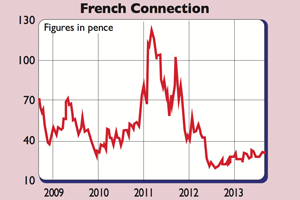
Most of us know that making money from selling stuff on the British high street is tough. Get your products and pricing right and you can do well. Get it wrong and you lose money and risk going bust. French Connection is firmly in the latter camp.
It is a brand that shoppers are aware of and it has at times been very popular. But at the moment it’s just not selling enough products to make money, and doesn’t look like it will do so for a while yet. It seems that shoppers may like its fashions but are not prepared to pay the full asking prices for them, and so wait for them to go on sale. This is not what you need when you have rents, staff and other fixed costs to pay. But if the management team can turn the business around, then losses can turn to profits quite quickly.
French Connection’s difficulties with selling more goods are the reason the company is held in such low esteem by the stock market. At 32p, the equity of the company is valued at just £30.7m. That’s extremely low – in fact, it is trading below its net working capital value. If you add up the value of its stock, debtors and cash, then take away all its liabilities as of June of this year, you get a value of £44.8m or 46.7p per share. No value is given to the company’s fixed assets at all.
That’s the sort of valuation to make a bargain-hunting investor prick up their ears. Companies like this helped legendary value investor Benjamin Graham make a lot of money from the stock market. As long as their balance sheet values were realistic, some of these stocks were exceedingly cheap, and went on to make huge gains when they recovered.
Does French Connection fit the bill? Not yet. That’s because its UK retail business is trading from too many unprofitable stores that are tied into long-term rental agreements. Landlords are finding it hard enough as it is to keep hold of high-street rents just now, and will want to be compensated for terminating leases early. This makes it very expensive for French Connection to close stores.
It has shut four down so far this year and will close another three in the next few months, but slimming down to the right size will take time. However, with losses expected to hit £6m for the full year, the fact that it has £22m of cash means it can survive for a few years at the current loss rate.
As the chart above shows, the shares have bounced strongly off very low prices in the past. If management can turn the company around and get out of loss-making leases, serious money could be made by buying now. The difficulty of its task makes the shares a gamble for brave and patient investors.
Verdict: a risky punt for the bold
How our Debenhams tip has fared
It’s been a rocky ride for Debenhams’ shareholders this year. I tipped shares in the department store chain at 95p back in February, only for them to fall below 80p when bad weather saw sales slump. However, sticking with the shares has paid off, as the company continues to prove that it is one of the country’s better retailers.
It has recovered over the summer and continues to gain market share in its key markets of clothing, womenswear and beauty products. Online sales have increased by 46% this year, while gross profit margins have been maintained. This is good news, as it shows that those market share gains are sustainable, and have not come about simply as a result of cutting prices.
This year’s profit forecasts are in the bag. While the shares are rated slightly higher than in February, on 10.3 times next year’s earnings they still look decent value.
Verdict: keep buying